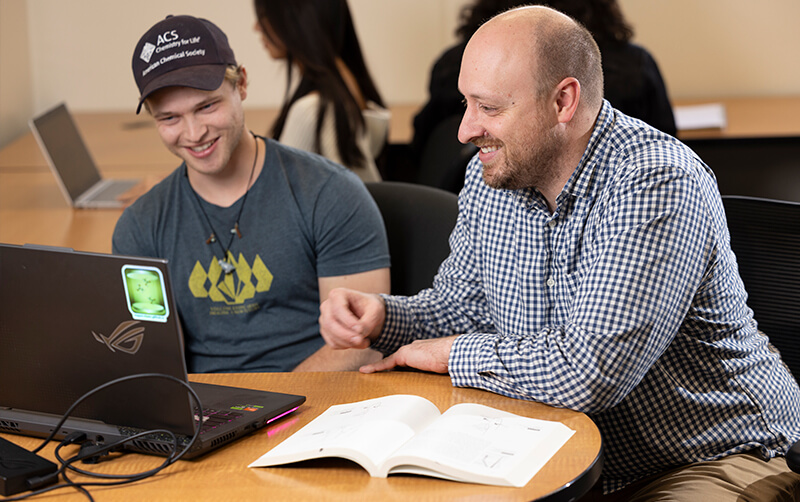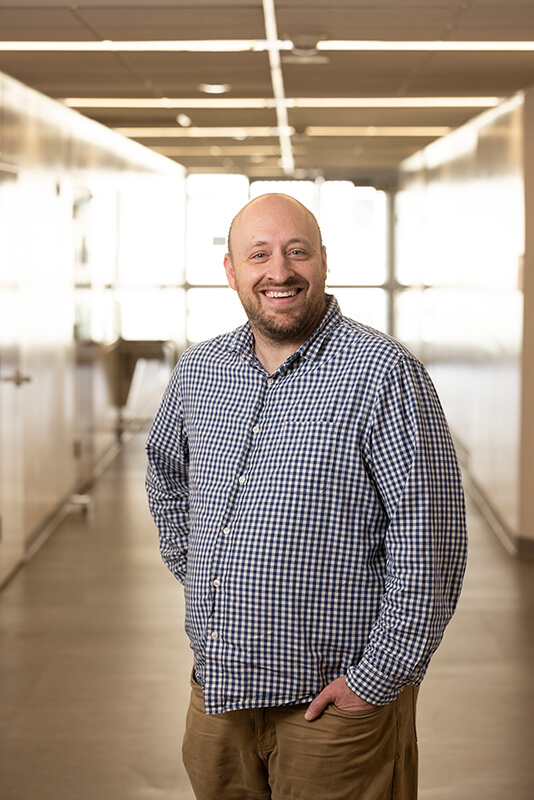
For theoretical chemist Andrew Petit, his dedication as a teacher-scholar is evident in his work of mentoring 75 student researchers over the past decade at Cal State Fullerton.
His students have presented award-winning work at over 80 scientific conferences, co-authored 15 peer-reviewed publications, and many have gone on to prestigious graduate programs.
“I’m excited to provide my students with the opportunity to engage in cutting-edge, computational research in collaboration with experimentalists,” said Petit, associate professor of chemistry and biochemistry. “This allows students to experience firsthand the interplay between theory and experiment that drives modern science.”
For his work as a mentor and researcher, Petit has received the 2025 Henry Dreyfus Teacher-Scholar Award from the Camille and Henry Dreyfus Foundation. He is one of eight Henry Dreyfus Teacher-Scholars selected this year from universities across the country.

Petit is the third CSUF faculty member in the Department of Chemistry and Biochemistry recognized with the prestigious national award, which supports early-career faculty in the chemical sciences at primarily undergraduate institutions.
Michael Groves, associate professor of chemistry and biochemistry, received the award in 2024. In 2000, Fu-Ming Tao, professor of chemistry and biochemistry, was given the accolade.
“I’m honored to receive an award that recognizes my student-centered efforts in both teaching and research. It gives enormous credibility to the excellent work of my research team,” said Petit, who began teaching at CSUF in 2015.
Niroshika Keppetipola, chair and professor of chemistry and biochemistry, said Petit fosters scientific discovery and the professional growth of the next generation of chemists.
“Dr. Petit has established a highly productive and impactful research program that exemplifies the integration of innovative scholarship with exceptional student mentorship,” Keppetipola said.
“Through his leadership, he has created a vibrant and inclusive research environment, where undergraduate and graduate students receive rigorous training in advanced computational chemistry and high-performance computing.”

Petit’s research focuses on using computational tools to answer fundamental questions about what happens after molecules absorb light and become excited.
“My research involves photochemistry. The idea is that when a molecule absorbs the right color of light, it becomes excited, which causes dramatic changes in its chemical properties,” Petit explained.
Petit, who earned his doctorate in chemical physics from Ohio State University, said that photochemistry has a range of applications, spanning from solar energy, medical imaging to green chemistry.
His work aligns with green chemistry by using light to modify the pathways chemical reactions follow, making them more efficient and environmentally friendly. Petit’s research has the potential to impact the production of pharmaceutical drugs, plastics and dyes, as well as lead to the discovery of new molecules with essential properties.
As part of his award, Petit is receiving a $75,000 grant to support his research. His work also includes serving as associate director of the Titan Supercomputing Center.
With the funding, he plans to purchase additional compute nodes, which perform computational tasks, for the center’s Turing supercomputer. The award will also support student travel to research conferences.
Outside of research, Petit’s goals include teaching students how to ethically and effectively use artificial intelligence and data science tools, preparing them for advanced degrees and the workforce.
“I’m interested in helping our students develop literacy in AI and data science,” he said. “I believe that these tools will continue to be an important component of modern science in both academia and industry.”